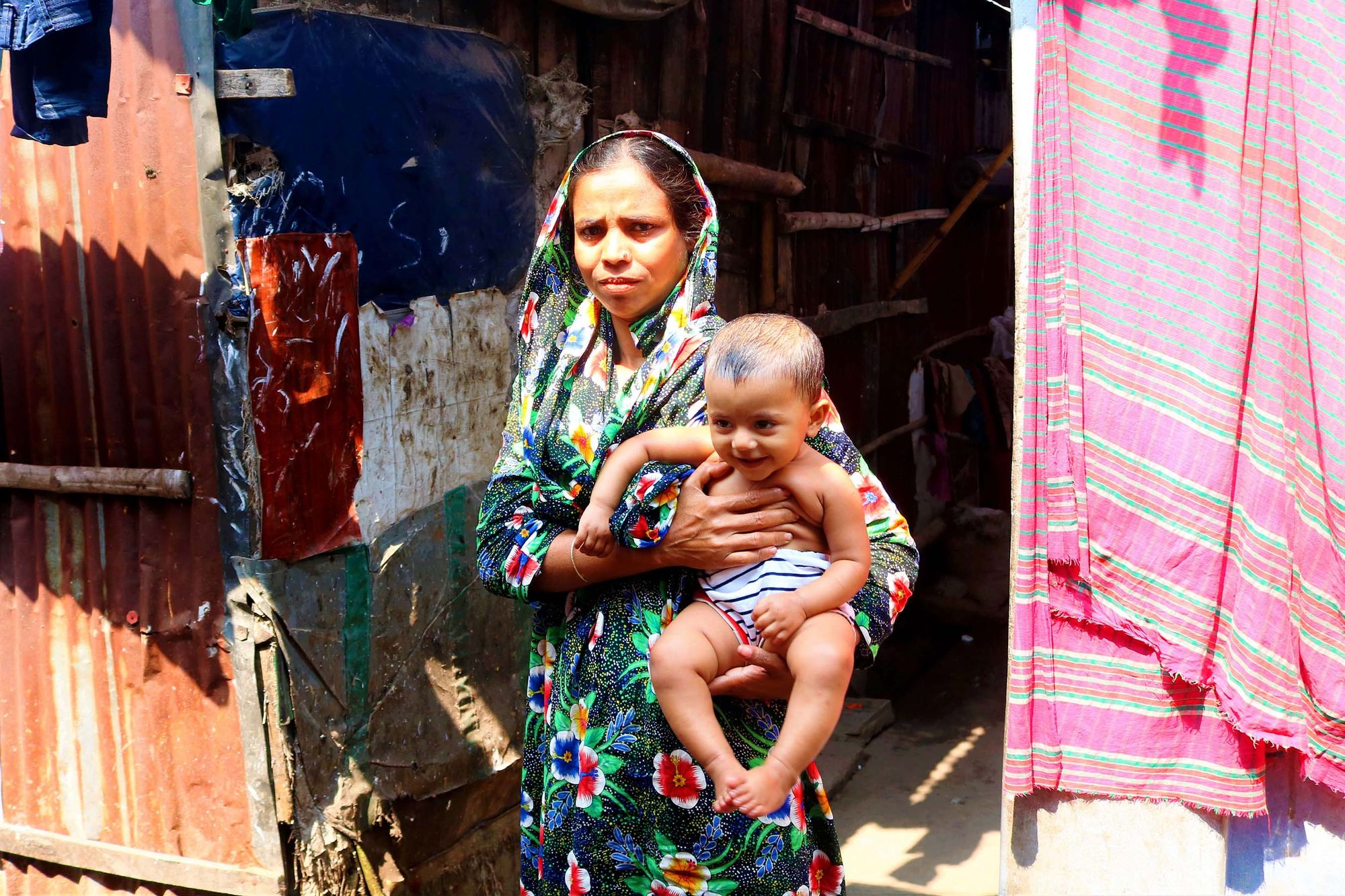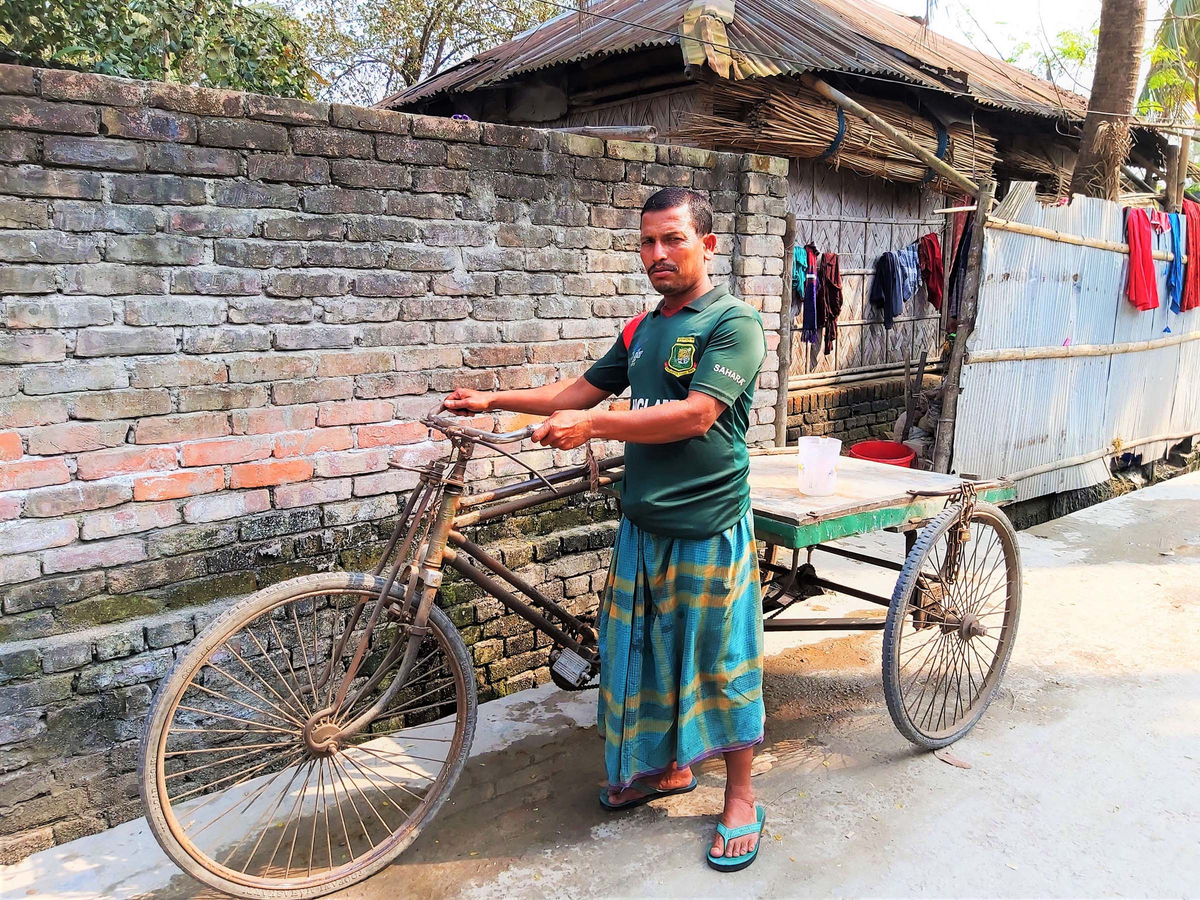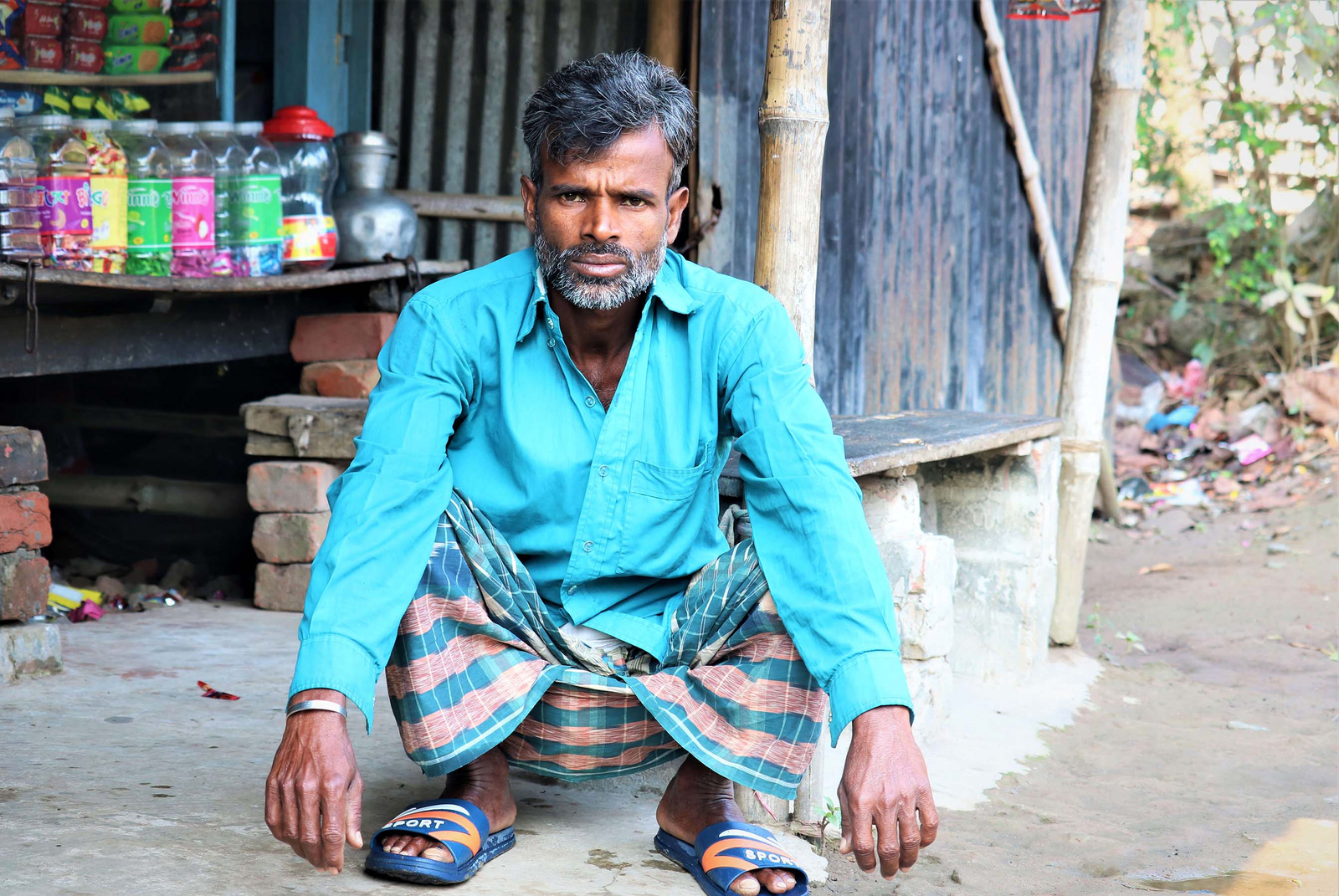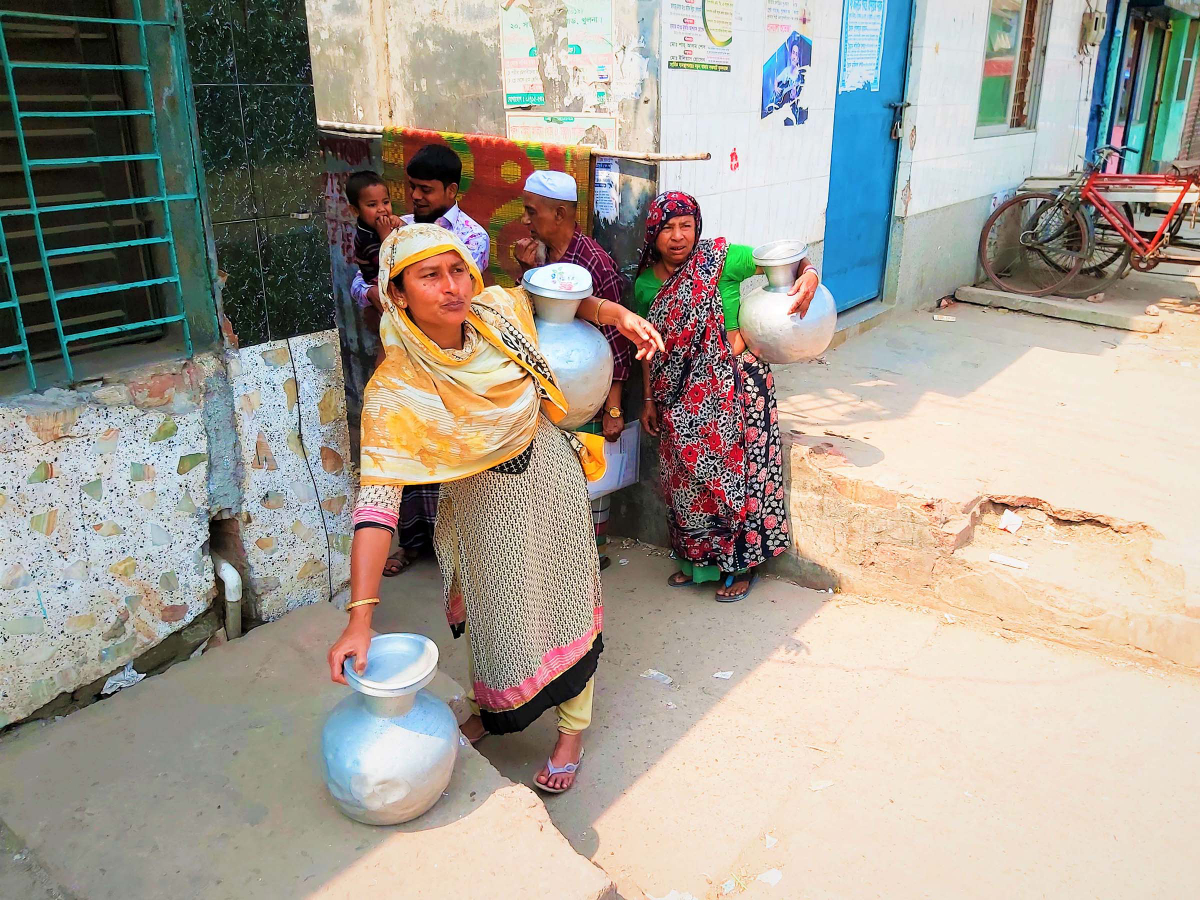With climate-induced increase in inundation and salinity, instead of living in constant fear, fishers and farmers leave their coastal villages. They migrate to cities, becoming labourers and cart pullers. Mosabber Hossain writes about migrants' preference for living in inadequate slums and experts advocating for their safety and rights.
A year ago, Roeda Begum (42), hailing from coastal Koyra, moved to the Notun Bazar slum in Khulna, the third largest city in Bangladesh.
When water level rose in Koyra, inundating the enclosure where Begum's family grew fish, her husband Afsar Hossain started pulling van – local parlance for a cart pedalled or pulled manually to transport goods. Unable to sustain his family of three children with his income, he moved to Khulna.
Though Roeda Begum finds life in the slum safer than in Koyra, she has to pay a high rent of 1,500 taka a month. She plans to work as a maid, once her four-month-old son grows a little older.
Unable to face the disastrous consequences of climate change in their coastal hometowns, many like Roeda Begum move into city slums. Having lost their home and land to flooding and seawater intrusion, and with hardly any livelihood options, they migrate to cities and try to make a living.
Some moved 20 years ago, while some came after big cyclones such as Aila of 2009 and Sidr of 2007. This move changes their life completely. Men become labourers, rickshaw pullers and vendors, and women become maids.
A study on internal migration conducted by GIZ Bangladesh, a development agency, found that 57% of slum dwellers in Barishal, Khulna, Rajshahi, Satkhira, and Sirajganj cities are climate migrants. The study covering more than 17,000 households at 47 slums in the cities was carried out from January 2018 to April 2019.

Climate-induced migration
Ainun Nishat, climate specialist and emeritus professor at BRAC University said that increase in salinity and loss of agricultural land are the key reasons behind climate-induced migration. The stories of slum dwellers in cities bear testimony to this fact.
Zaheer Mia (41) moved to Kalyanpur slum in the capital city Dhaka last year with his wife and two children when he lost his cultivable land to floods. Now he is a rickshaw puller, earning 500 taka a day.
Sajida Begum and her husband came to Rawal Mahal slum in Khulna from Pratap Nagar village three years ago, when seawater intrusion made their land uncultivable. At the slum, Sajida Begum cooks three meals a day for 13 van pullers, charging each 100 taka per day. "Though we are doing better financially in the slum, we long for home," she said in a choked voice.

Impact on families
Moina Begum lives in a slum beside the railway track in Jessore. When Cyclone Sidr rendered their land uncultivable, her husband went to India with a broker's help, to find work. She did not hear from him again. The single mother and her older son earn, while her seven-year-old son goes to school.
When Rabiul Islam (35) of Koyra lost his land to Cyclone Aila, he became a van puller in his hometown, earning about 120 taka per day. As it was not enough to meet his family's needs, he moved to Khulna's Boyra Rayermohol slum, occupied mostly by climate migrants.
From his daily income of 500 taka, every day he pays 100 taka as van rent and 100 taka for meals, and a monthly house rent of 500 taka. As his income is meagre, he left his wife and two sons behind in his hometown, visiting them occasionally.

Choice between life and living in slums
Amirul Islam (35) came to Jessore's rail slum from Shamnagar four years ago, when he lost his agricultural land to Cyclone Aila, and could not earn enough locally. Now he works as a labourer, earning 400-500 taka a day; his wife Sufia Begum works in a hostel, earning 2,400 taka a month. Their monthly house rent is 1,000 taka. They dream of educating their school-going children well so they can do better in life.
"Wages decline as the number of migrants increases," said Amirul Islam. "There is no land and work in our village. It's better to suffer here than to die there of hunger."
Some slums lack safe water and sanitation facilities. Bathrooms are far from the living quarters, posing a safety risk for women, especially at night. Sometimes they are sexually harassed by men.
Morzina Begum walks a kilometre every day to collect drinking water. "We have to bathe in the open where men also bathe. We can feel the men's eyes on us. There are many problems," she said.
Mahbuba Nasreen, director of Dhaka University's Institute of Disaster Management and Vulnerability Studies said migrant women suffer a lot in the slums, facing water and sanitation problems. "Building resilience and capacitating these women are more necessary than portraying them as vulnerable," she said.

Increasing disasters
"As a result of climate change, we see many unusual natural events like floods, droughts, rising sea levels and irregular rainfall," said Md Ashraf Uddin, director general of environment department.
Of the 51 major disasters that hit Bangladesh between 2009 and 2018, Cyclone Aila made the most severe impact, affecting around 1.34 million people in 2009.
Floods are the most recurrent natural disasters. There were 16 floods in Bangladesh over the past 10 years, affecting around 22.66 million people. In the last three years, there have been five floods, affecting 2.1 million people.
In addition to floods and cyclones, cold waves, landslides and other disasters have affected a large number of people in recent years according to a study conducted jointly by the Swedish organisation Raoul Wallenberg Institute of Human Rights and Independent University Bangladesh.
Abdul Awal Khan, associate professor of law at IUB who was involved in the research, finds the need to bring the issue of climate-induced human displacement in international forums.
Calamities and an uncertain future
The intensity and frequency of natural calamities will increase in Bangladesh in the coming years due to climate change. The rise of salinity in coastal districts and food shortage will increase. Women and children will suffer the most.
Md Ashraf Uddin said that government was focusing on gender issues in the National Adaptation Plan (NAP).
Ameena Begum and her husband came to Dhaka from Dhubani village when they lost their house to River Teesta. "Once we had everything. But now we can't even admit our two children in school. We don't know about our feature," she said with tears.
The Ministry of Environment and Forests and UNDP plan to launch a three-year NAP. "The government has increased climate-related expenditure from Tk 109 billion in 2015-16 to Tk 237 billion in 2019-20," said Md Ashraf Uddin. "Coordination among different government and non-government agencies is a big challenge."
With more people migrating to cities each year, mostly due to increasing climate-induced disasters and ensuing loss of livelihood, the pressure on land and water resources of cities also increases. The situation is likely to worsen in the coming years, and experts advocate government intervention.
According to Awal Khan, the country lacked adequate legal framework and institutional management to protect the rights of displaced people. "The government must ensure their rights," he said.
"The number of calamities caused by climate change may increase in the coming days," said executive director of the Bangladesh Centre for Advance Studies Dr Atiq Rahman. "That's why government must have a plan to ensure the safety and rights of the people who will be displaced."




